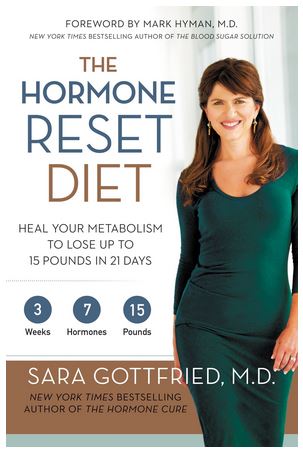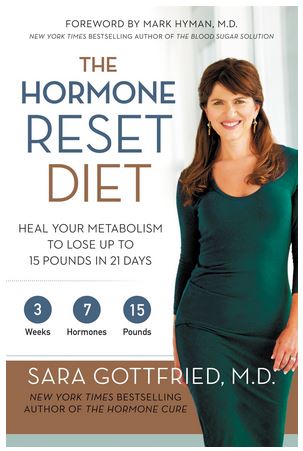The Hormone Reset Diet
Dr. C: So, the beautiful thing is that you have an awesome, new book, giving women more ways to fix this. What are some easy, take-home strategies that someone can start on while they are waiting for the book?
Dr. Sara: I have an advanced copy of my book here, THE HORMONE RESET DIET. There are a couple of things people can do right away. I have these seven, medical hormones that I want you to reset in 3-day sets.
So, it’s a 21-day program. For the first reset, I want you to go meatless, and this is kind of controversial, now that Paleo is popular.
Dr. C: I love that you are breaking out of the norm right now. I just had to say that is so awesome. Sorry for interrupting.
Dr. Sara: I appreciate that because — let me get super vulnerable here because I went on Paleo. When I was struggling with my weight, I went on Paleo, and I gained weight.
The Problem with Paleo
Dr. Sara: It was too much saturated fat for me. I have all these cookbooks that have you make a bacon cup. It always involves bacon. These meats are sourced from very healthy places, but it was not a good for fit for me.
There are randomized trials that show Paleo allows you to get to a certain body weight – a body mass index of about 23 but not lower than that.
I like to hang out with a body mass index of 21or 22, as that is where all my clothes fit, and I could not do it with Paleo. It was just a little too much saturated fat. What happens is a lot of people who go on Paleo focus on the meat. At least, this is what my husband does.
He wants his steak and maybe a little bit of vegetables – three asparagus spears would be about right. That is not so good for you. So, we know that meat eaters have higher estrogen levels. They are more likely to have estrogen dominance. It changes the set of bacteria that are in your gut, which is known collectively as the microbiome.
This set of bacteria is the microbes in your gut and also their DNA. There is even a subset of the microbiome, called the estrobolome. This is the aggregate of microbes, including bacteria that can control your estrogen levels. So, you really can impact your estrogen levels with your fork.
Dr. C: This is a really wild concept, so let me go a little bit deeper, if you do not mind.
Dr. Sara: Our way to geek out.
Digging Deeper
Dr. C: Yes, we will geek out a little bit as we have some really advanced people here. Our hormones are made and regulated in a lot of ways.
There is hard data that shows what’s happening in our intestinal tract may be one of the biggest variables in how our hormones may be regulated.
Dr. Sara: Yes, and this is a huge shift, right? Alan, correct me if I am wrong, but I was taught that it was controlled by the HPA – this kind of brain-adrenal access.
The hypothalamic pituitary-adrenal-thyroid-gonadal access, if you want to get super fancy. It turns out that the microbiome is actually controlling quite a bit of our hormone levels, and it is a very interesting, new area.
The point I was making is that meat is not always the best thing to focus on when it comes to trying to get healthy and lean in your body.
I think women are more vulnerable here. I think because of the testosterone advantage, men will have lower estrogen levels, so they can get away with eating more meat.
Going “Hardcore” on Paleo
Dr. C: Let me throw a little thing in here quickly. I went hardcore Paleo for a couple weeks and tried to get fat-adapted.
At the time, there was a course I rode at our mountain home. It was about a 20-mile, off-road course at high elevations, and I could knock it out in an hour and 10 minutes pretty consistently.
After a couple weeks of getting fat-adapted, I gimped and killed myself just to finish the dang thing in two hours.
Dr. Sara: Wow. Okay. This is how Alan tests different diets, right? He goes cycling and then figures it out.
Dr. C: Watch the minutes and miles. It’s pretty objective stuff.
Dr. Sara: It’s pretty good. As you can imagine, when Alan takes me on some of his extreme hiking, rock climbing, cycling adventures, sometimes I am doing yoga at the base and waiting for him to come back!
Dr. C: You have always kept up and done great.
Going Meatless
Dr. Sara: Well, in my own way. So, going meatless is one of the strategies I have been working with and teaching for a number of years.
I first taught this program in 2008 when I was trying to solve my own hormonal problems. I have tweaked it over time. The idea is full immersion where you really address estrogen and its relationship to the estrogen receptor.
So, you go meatless, increase the amount of fish and shellfish and the Omega-3 you are getting. Also, get off of alcohol. This is one that makes me a little less popular, but it needs to be said.
Alcohol raises your estrogen levels, and if you tend to be estrogen dominate, it is adding to the problem. It slows down metabolism. Then, it can clog up the liver, which is like the traffic cop in the body for all your hormones.
It also raises cortisol, and here we go again. We cannot have a conversation without talking about cortisol. I am not saying never drink again. I am saying get off the sauce for 21 days. You are probably causing some problems in your body, especially with estrogen.
The Value of Research
Dr. C: That is awesome. So, I want to make sure everyone is really clear on this. Sara and I have both been in this space reading books, researching and studying for decades, and I know 99% of the stuff you hear is copycat information. This is not what Dr. Sara is doing.
She is not just putting out what came out in the last book from someone else. This is real, in-depth, thought-out, distinct content, and she is not afraid to say what is effectively working and what science shows.
Sometimes you have to ruffle a few feathers, and that is what it takes. That is why we are really fighting for your health, and we are not afraid to do that. So, kudos to you, Sara. That is really cool.
Dr. Sara: Well, thank you, Alan. I always appreciate that you stand with me in terms of standing up to the problems that are causing health issues for our people – whether that is big chemistry and the endocrine disruptors that we get exposed to or a problem with alcohol and how some people process it.











